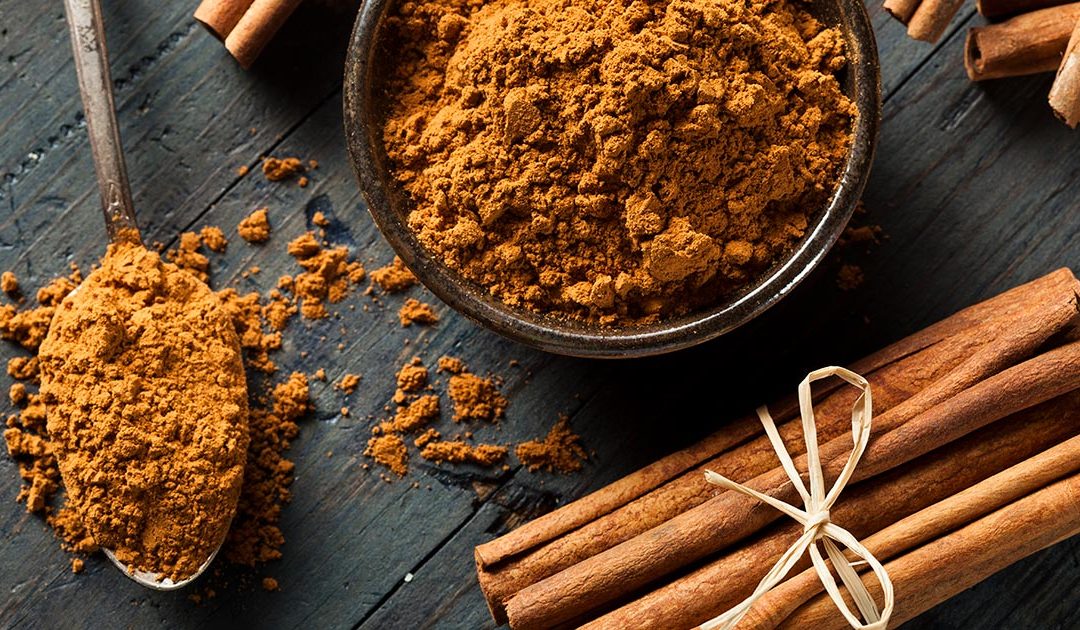Cinnamon is one of those common spices with which we’re all familiar. It’s liked by most and easily attainable. But, you likely may have heard that cinnamon has some unique health benefits?
Okay, so did you know there’s more than one variety of cinnamon?
During my time in grad school, professors often touted the health benefits of cinnamon without hesitation. But a lot of time has passed since grad school.
Let’s dig deeper into the more recent research about cinnamon. And the side of cinnamon that is less commonly known.
Then we can make an informed decision as to the legitimate health benefits of cinnamon.
Some claims are a little, shall we say, extreme. But there are some solid benefits of cinnamon.
A little background.
Where Does Cinnamon Come From?
It’s a tree grown in warmer tropical environments.
During cultivation, the bark is stripped. The inner layer is scraped off into rolls and dried. If you’ve purchased unground cinnamon, you know what I’m talking about.
There are four countries that heavily contribute to the production of cinnamon. But there are a lot of varieties from different regions within those countries. I believe there are over 250 different species of cinnamon.
Let’s focus on the more commonly known and those with claimed benefits. Most of which can be obtained by your local grocery store’s cinnamon.
The following countries are the biggest players in the production of cinnamon:
- Indonesia
- Vietnam
- China
- Sri Lanka
Different types of cinnamon
Apparently, it’s nearly impossible to distinguish between many of the different types of cinnamon without a microscope or lab equipment.
So instead of listing all the different types of cinnamon, let’s look at the benefits as a whole.
Many have similar benefits anyway. So it comes down to using what’s attainable and affordable.
So, in my opinion, save your money and buy cinnamon at the grocery store. Not at your local GNC. Again, they all have similar benefits.
But regardless, let’s look at a few different versions of cinnamon that seem to pop up on Google searches.
Ceylon Cinnamon
Ceylon cinnamon is also known as cinnamon zeylanicum that’s native to Sri Lanka. There are a lot of claims, but not a lot of current research.
Regardless, Ranasinghe states “CZ demonstrated beneficial anti-hyperlipidaemic and blood pressure lowering effects among healthy adults.”
When I Googled “Ceylon cinnamon health benefits”, all kinds of claims and supplements popped up. I’m not a fan of exploiting something for monetary gain.
So, based on my literature review, use it on occasion for cooking. The health benefits of Ceylon cinnamon seem to be limited to reducing blood pressure and anti-hyperlipidaemic effects.
But don’t bank on extreme numbers. Cut your sugars and eliminate processed foods and you’ll blow those numbers out of the water.
Korintje Cinnamon
Sorry. I couldn’t find any peer-reviewed research stating any additional benefits from Korintje Cinnamon.
Regardless, it’s native to Indonesia and also known as Cinnamomum burmannii.
If it’s what’s available to you, use it!
Cinnamon in coffee health benefits
There’s no specific requirement as to what you add to your coffee. There are plenty of benefits to mild caffeine consumption. And there are plenty of benefits to drinking coffee.
So it’s a no-brainer to add cinnamon to your coffee if you enjoy the flavor. If you don’t, just add it to something else and enjoy your coffee the way you like.
Cinnamon and tea benefits
The same applies to tea as applies to coffee. There are several benefits to incorporating tea into your regimen based on its polyphenol levels.
So, if you like the flavor of a particular tea with cinnamon, use it. Perhaps there’s a reason cinnamon is on the list of ingredients of Chai tea.
Honey and Cinnamon
There does appear to be some benefit to combining cinnamon and honey against a type of streptococcus mutan that causes dental caries (cavities/tooth decay).
Otherwise, a lot of the other research was moot when it comes to additional health benefits.
I constantly see “may aid in…” and I want to bang my head into the wall. Seriously, let’s not get carried away in micro-improvements.
Instead, let’s focus on the larger “macro” improvements you can make to change your health for the better.
Cinnamon and glucose tolerance
This is a concept I have preached for a long time. In fact, I even told my parents a long time ago to incorporate cinnamon for just this reason.
As they were aging and still eating a lot of sugar, I said the least you can do is “down some cinnamon” to help you process the sugars.
That was a long time ago and to this day, they still incorporate cinnamon in their diet.
All these years later, I’m still finding positive research to support my suggestions.
Sharma states,
“C. Zeylonicum (Cinnamon Ceylon), which seems to reduce plasma blood glucose concentration more effectively when it is compared with metformin. It enhances the expression of proteins involved in glucose transport, insulin signaling, and regulates dyslipidemia.”
There’s more research. In other words, it really does help you process sugar.
Cinnamon as a preservative
It appears as though cinnamon essential oils may have some preservative properties. When I looked into the food science application of cinnamon, preservation was a hot topic.
This concept was foreign to me, but apparently, cinnamon has some antimicrobial properties.
I can’t argue with using cinnamon as an antimicrobial agent in commercial food preparation. At least it’s recognizable and you’ll know what it is as an ingredient.
Is Cinnamon Safe?
Yes, it has long been deemed as generally regarded as safe by all government watchdog agencies.
And historically speaking, cinnamon has proven safe from many years of use.
Very rare cases of intraoral allergic contact dermatitis can happen. But apparently, it’s very rare and non-life-threatening.
There is one component in some varieties of cinnamon called coumarin that is toxic in high doses. Make sure you know if the variety you like is high in coumarin.
If so, make sure you learn the upper limits.
Regardless, I believe you have to consume an enormous amount.
Researchers thoughts
Here are some reviews of what I compiled on a solid literature review. These are generalized to cinnamon overall and not to a specific species.
Guicin states,
“This study proposed that cinnamon might be a promising potential source of beneficial phenolics to treat several diseases including postural tachycardia syndrome, myasthenia gravis, diabetes, and neurodegenerative diseases, including AD.”
Ranasinghe states,
“CZ demonstrated beneficial anti-hyperlipidaemic and blood pressure lowering effects among healthy adults.”
Sharma states,
“C.Zeylonicum (Cinnamon Ceylon), which seems to reduce plasma blood glucose concentration more effectively when it is compared with metformin. It enhances the expression of proteins involved in glucose transport, insulin signalling, and regulates dyslipidaemia.”
Conclusion on Cinnamon
Cinnamon wasn’t always abundant, but it certainly is today. There is enough research to suggest incorporating it into your dietary regimen. There are a lot of claims.
Yes, it’s good for you. Don’t get caught up in the “it will save your life” claims. But it’s worth incorporating.
So, what’s the best cinnamon for health? Whichever is attainable and affordable for you. Again, don’t get too caught up in all the claims.
Just know that it’s a “health-positive” spice and incorporate it into your meal preparation.
And besides the health benefits, it’s just good! Why not add it to your meals or protein shake?
There are no shortages of vehicles for you to incorporate cinnamon into for consumption.
Have you used cinnamon to help improve your health?
FAQs
What do cinnamon and honey do for your body?
Best I could find is its aid in preventing dental caries.
What does cinnamon do for your health?
It helps improve glucose tolerance, reduce blood pressure and reduce lipid levels.
Is cinnamon beneficial to your health?
Yes. It’s too attainable and inexpensive not to incorporate it to help with glucose tolerance, improve blood pressure and reduce lipid levels.
References
Brnawi, W.I., Hettiarachchy, N.S., Horax, R., Kumar-Phillips, G., Seo, H.-S. and Marcy, J. (2018), Comparison of Cinnamon Essential Oils from Leaf and Bark with Respect to Antimicrobial Activity and Sensory Acceptability in Strawberry Shake. Journal of Food Science, 83: 475-480.
Ilhami Gulcin, Ruya Kaya, Ahmet C. Goren, Hulya Akincioglu, Meryem Topal, Zeynebe Bingol, Kader Cetin Çakmak, Sevim B. Ozturk Sarikaya, Lokman Durmaz & Saleh Alwasel (2019) Anticholinergic, antidiabetic and antioxidant activities of cinnamon (cinnamomum verum) bark extracts: polyphenol contents analysis by LC-MS/MS, International Journal of Food Properties, 22:1, 1511-1526
Isaac-Renton, Megan MD; Li, Monica Kayi MD; Parsons, Laurie M. MD, FRCPC Cinnamon Spice and Everything Not Nice, Dermatitis: May/June 2015 – Volume 26 – Issue 3 – p 116-121.
Ranasinghe, P., Galappaththy, P., Constantine, G.R. et al. Cinnamomum zeylanicum (Ceylon cinnamon) as a potential pharmaceutical agent for type-2 diabetes mellitus: study protocol for a randomized controlled trial. Trials 18, 446 (2017).
Ranasinghe, P., Jayawardena, R., Pigera, S. et al. Evaluation of pharmacodynamic properties and safety of Cinnamomum zeylanicum (Ceylon cinnamon) in healthy adults: a phase I clinical trial. BMC Complement Altern Med 17, 550 (2017).
Ranasinghe, P., Galappaththy, P., Constantine, G.R. et al. Cinnamomum zeylanicum (Ceylon cinnamon) as a potential pharmaceutical agent for type-2 diabetes mellitus: study protocol for a randomized controlled trial. Trials 18, 446 (2017).
Mohammad Bagher Rezvani, Mohammad Niakan, Mohammad Kamalinejad, Fateme Sadat Ahmadi, Faeze Hamze, The synergistic effect of honey and cinnamon against Streptococcus mutans bacteria, Asian Pacific Journal of Tropical Biomedicine, Volume 7, Issue 4, April 2017, Pages 314-320.
Singletary, Keith PhD Cinnamon, Nutrition Today: 1/2 2019 – Volume 54 – Issue 1 – p 42-52.
Suresh Sharma, Anindita Mandal, Ravi Kant, Sanjay Jachak, Meenaxi Jagzap, Is Cinnamon Efficacious for Glycaemic Control in Type-2 Diabetes Mellitus? RECENT ADVANCES IN ENDOCRINOLOGY, JPak Med Assoc, Vol.70, No.11, November 2020.
Wijesekera RO. Historical overview of the cinnamon industry. CRC Critical Reviews in Food Science and Nutrition. 1978 ;10(1):1-30.



